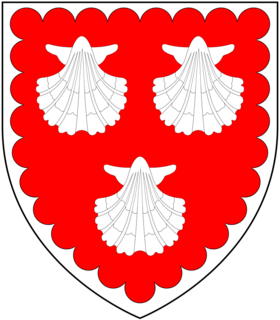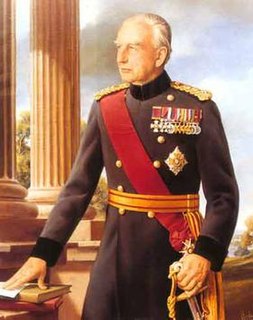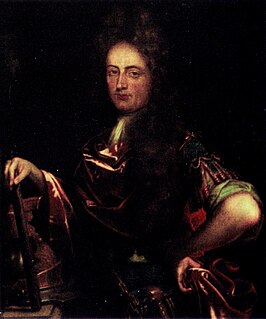
Field Marshal James O'Hara, 2nd Baron Tyrawley and 1st Baron Kilmaine, PC, was an Irish officer in the British Army. After serving as a junior officer in Spain and the Low Countries during the War of the Spanish Succession, he went on to become British ambassador to Lisbon establishing a close relationship with King John V there. He undertook a tour as British ambassador to Saint Petersburg before becoming Governor of Gibraltar where he set about improving the fortifications. He was briefly commander of British troops in Portugal during the Seven Years' War but was replaced within a few months. During his military career he was colonel of eight different regiments.

Field Marshal George Townshend, 1st Marquess Townshend, PC, known as The Viscount Townshend from 1764 to 1787, was a British soldier and politician. After serving at the Battle of Dettingen during the War of the Austrian Succession and the Battle of Culloden during the Jacobite Rising, Townshend took command of the British forces for the closing stages of the Battle of the Plains of Abraham during the Seven Years' War. He went on to be Lord Lieutenant of Ireland or Viceroy where he introduced measures aimed at increasing the size of Irish regiments, reducing corruption in Ireland and improving the Irish economy. In cooperation with Prime Minister North in London he solidified governmental control over Ireland. He also served as Master-General of the Ordnance, first in the North Ministry and then in the Fox–North Coalition.
Nicholas Purcell, 13th Baron of Loughmoe was the son of James Purcell of Loughmoe and the maternal nephew of James Butler, 1st Duke of Ormonde.

General Thomas Erle PC of Charborough, Dorset, was a general in the English Army and, thereafter, the British Army. He was also a Whig politician who sat in the House of Commons of England and of Great Britain from 1678 to 1718. He was Governor of Portsmouth and a Lieutenant-General of the Ordnance.
Sir Maurice Eustace, Baronet was an Irish gentleman, the only holder of the Eustace Baronetcy of Castle Martin in County Kildare, which was created for him in the Baronetage of Ireland on 23 December 1685.
Major General Henry Conyngham of Slane Castle was an Irish soldier and politician.
Lieutenant-General William Kerr, 2nd Marquess of Lothian, was a Scottish peer who held a number of minor military and political offices. He was known by the courtesy title of Lord Newbattle until 1692, when he succeeded as Lord Jedburgh, then as Marquess of Lothian when his father died in 1703.

General Sir Geoffrey Richard Desmond Fitzpatrick, was a senior British Army officer who served as commander of the British Army of the Rhine and Deputy Supreme Allied Commander Europe. After his retirement from the army he was appointed Lieutenant Governor of Jersey and later held a ceremonial position in the Royal Household.
William O'Shaughnessy, The O'Shaughnessy was an Irish Chief and Major-General.

Charles O'Brien, 5th Viscount Clare (1673–1706) was the son of Daniel O'Brien, 3rd Viscount Clare and Philadelphia Lennard. He married Charlotte Bulkeley, daughter of Henry Bulkeley and Sophia Stuart, on 9 January 1696, at Saint-Germain-en-Laye, France. Henry Bulkeley was the "Master of the Household" for Kings Charles II and James II.
General Sir William Stewart, was a Scottish-born soldier, Commander-in-chief of Queen Anne's Forces in Ireland, Member of Parliament for County Waterford and a Privy Councillor. He was a benefactor of Hanover Square, London, donating the land and laying the first stone of St George's, Hanover Square.
William Stewart, 2nd Viscount Mountjoy, was an Anglo-Irish peer.
William Stewart, 1st Viscount Mountjoy (1653–1692), was an Anglo-Irish peer and soldier.
Thomas Butler of Garryricken, also known as Thomas Butler of Kilcash and sometimes distinguished by his rank of Colonel, was an Irish landowner. He succeeded to the estates of his grandfather Richard Butler of Kilcash. His brother Christopher was the Catholic Archbishop of Cashel and Emly. Thomas Butler fought for the Jacobites in the Williamite war and was taken prisoner at the Battle of Aughrim. His son John would, de jure, become the 15th Earl of Ormond.
The Coronation Honours 1911 for the British Empire were announced on 19 June 1911, to celebrate the coronation of George V which was held on 22 June 1911.
Major-General John Moyle was an officer of the British Army.
The 1907 Birthday Honours for the British Empire were announced on 28 June, to celebrate the birthday of Edward VII.
Robert Ramsay was a Scottish Jacobite soldier noted for his service during the Williamite War in Ireland. A Roman Catholic and veteran of the "French Brigade" which served in the Third Anglo-Dutch War under the Duke of Monmouth, Ramsay held the post of Adjutant-General of Foot in the English Army prior to the deposition of James II in the 1688 Glorious Revolution.
The 1940 Birthday Honours were appointments by King George VI to various orders and honours to reward and highlight good works by citizens of the British Empire. The appointments were made to celebrate the official birthday of The King, and were published on 9 July 1940.
The 1917 Birthday Honours were appointments by King George V to various orders and honours to reward and highlight good works by citizens of the British Empire. The appointments were made to celebrate the official birthday of The King, and were published on 4 June and 19 June.




